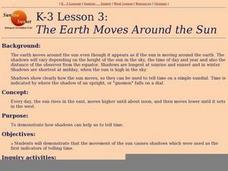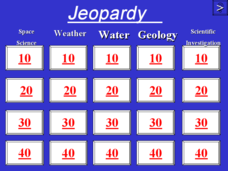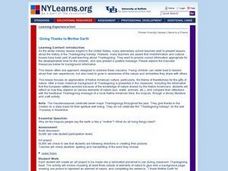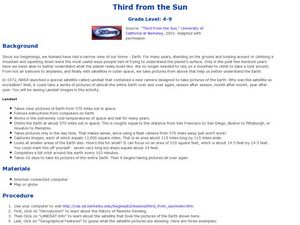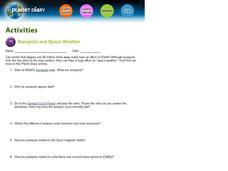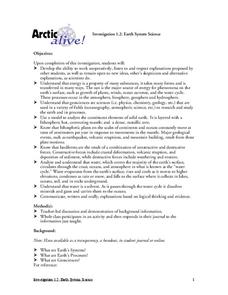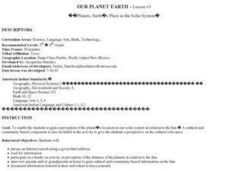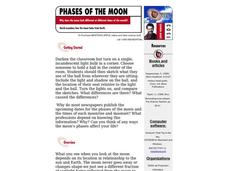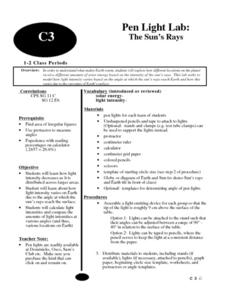Curated OER
The Earth, Sun, and Moon
In this solar system review activity, students use dictionaries to define the 10 listed terms pertaining to the Earth, sun, and moon.
Curated OER
Determining distance between planets and the Sun
Students use a model to determine the distance between the sun and plants in our solar system. They determine a scale to use that represents the distance between the Earth and sun. Students calculate the scale distance that each planet...
Curated OER
The Earth Moves Around the Sun
Students demonstrate that the movement of the sun causes shadows which were used as the first indicators of telling time.
Curated OER
Let's Think About Day and Night
Students explore day and night and the relationships between the Earth, the sun and the moon. They discuss the ways in which the sun and moon help us. They watch a short video that helps illustrate these concepts.
Curated OER
Earth's Poles
In this Earth's Poles activity, students survey, examine and dissect the North and South Magnetic Poles, the Earth's axis and summarize the Aurora legends. Students research six directives involving space weather and predicting answers.
Curated OER
The Tilt of the Earth And the Seasons
Fourth graders measure the change in the size of their shadow over time. They visit a fixed structure and record the date, the time, and the measurement of the length of their shadow. They do this over the course of the school year. They...
Curated OER
Jeopardy - Earth Sciences
Questions about water, weather, geology, astronomy, and the scientific process make up this Jeopardy game. It is a pretty well-rounded set of slides, although you may want to be aware that a few of the questions are specific to the state...
Curated OER
Motions and Their Effects
With a simple blackboard-style appearance, these slides list facts about the reason for the seasons, solstices, and equinoxes. It also touches on Kepler's first law of planetary motion. There are no pictures or graphics to help explain...
Curated OER
Giving Thanks to Mother Earth
Students create an art project to be made into a laminated placemat to use during a classroom Thanksgiving feast. The lesson involves choosing at least three cutouts of elements of nature to glue onto a background page, drawing one...
Curated OER
Third from the Sun
Students examine images from space. In this third from the Sun lesson, students examine images from, Landsat, the satellite launched by NASA in 1972.
K12 Reader
Why Does the Moon Orbit Earth?
Have you ever looked up at the moon and wondered why it looks different every night? Learn about the moon's orbit and the lunar cycle with a reading comprehension exercise. Using context clues, kids find the definitions of unfamiliar...
Curated OER
Season Worksheet #5
Sunrise, sunset, swiftly fly the years! Your earth scientists can also fly through a year of daylight data. They analyze a graph and then answer five multiple choice questions about the rising and setting of the sun, the total number of...
Curated OER
Sunspots and Space Weather
This assignment is out of this world! It is an online worksheet about sunspots and solar cycles, a sort of WebQuest if you will. Links to two NASA websites and spaceweather.com are written into the questions so that your aspiring...
California Academy of Science
Kinesthetic Astronomy: Moon Phases
We are the world! Each of your class members models Earth and holds a styrofoam ball to see its phases. Thorough teacher background information and a detailed lesson plan will make this a cinch to teach. If you do not want to purchase...
Astronomical Society of the Pacific
Getting Ready for the All American Eclipse!
Give your pupils a front row seat at the biggest light show in the sky this year! In addition to admiring the total solar eclipse, young astronomers can explain the phenomenon with a little help from an inquiry-based lesson. The focus of...
Curated OER
Globe Lesson 11 - Rotation of the Earth - Grade 6+
In this rotation of the Earth worksheet, students read a 2-page review of the rotation of the earth and respond to 10 short answer questions.
Curated OER
Science Quiz: Earth Quiz
In this earth science quiz worksheet, students respond to 20 short answer and true or false questions regarding earth science topics.
Curated OER
Earth System Science
Learners explore the Earth and its ability to support life. They discuss the geosphere and the water cycle and complete the Water Wonders activity. After completing the activity, they respond in their journals and reflect upon the...
Curated OER
How Can a Spacecraft Always Face the Sun?
Students determine the correct orbital path for a satellite that collects data about the sun so that its view of the sun never be obstructed by the Earth.
Curated OER
Earth's Place in the Solar System
Students study and discuss the planets. They create a visual representation of the layout of the solar system and color it. They also write an informative/narrative summary report on the cultural relevance of the Sun.
Curated OER
Wobbling in Circles
Sixth graders role play the parts of the sun, the moon and the Earth as they simulate the concepts of revolution and rotation. They act out the parts in small groups and discuss the concepts as a class.
Curated OER
Phases of the Moon
Young scholars explore why when you examine the moon depends on its location in relationship to the sun and Earth. The moon never goes away or changes shape-we just see a different fraction of sunlight being reflected from the moon to...
Curated OER
Pen Light Lab
Students study what makes Earth warm and explore how different locations on the planetreceive different amounts of solar energy based on the intensity of the sun's rays. They calculate light intensities and compare the
amounts of light...
Curated OER
The Reasons for the Seasons
Sixth graders conduct a controlled investigation to determine the length of the sun's shadow on a fixed object (i.e., flagpole, telephone pole, etc.) over a three-day period (one day in the fall, one in the winter, and one in the...
Other popular searches
- Earth Moon Sun System
- Sun and Earth
- Earth Sun and Moon
- Earth/sun/moon
- Sun Moon Earth
- Earth, Sun and Moon
- Sun and Earth Kindergarten
- Sun and Earth Orientation
- Rubric Sun Moon Earth
- The Sun and Earth




